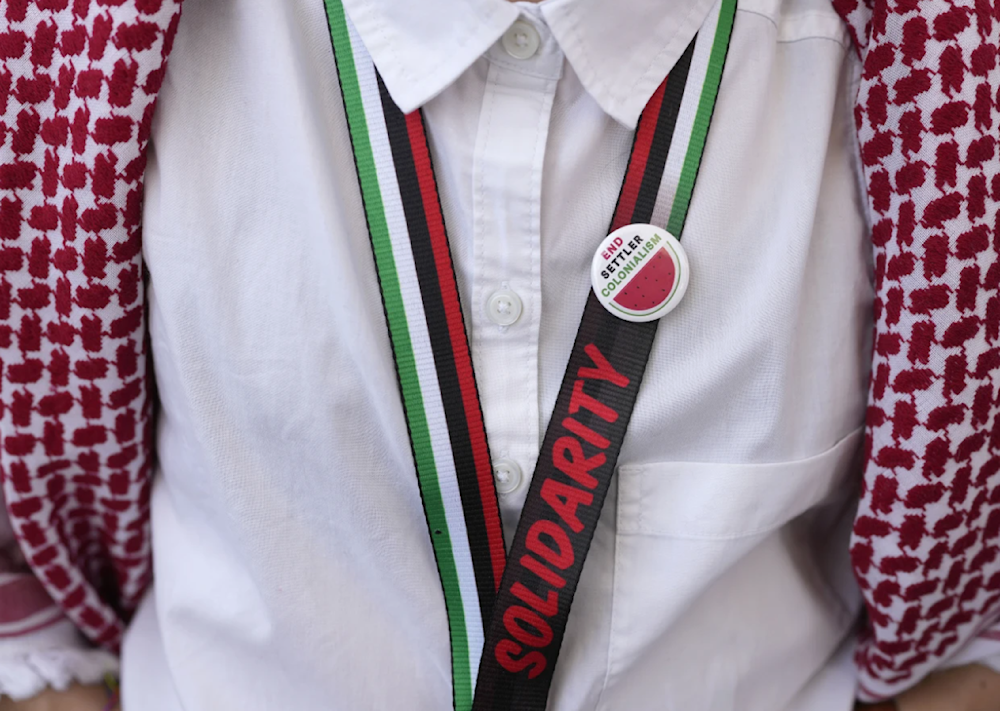Over 1,000 authors launch mass boycott of Israeli publishers
The letter calls the war on Gaza the most "profound moral, political, and cultural crisis of the 21st century."
-

A protester wearing a pin with a symbol of a watermelon participates in a demonstration calling for a ceasefire in the war on Gaza on December 3, 2023, in the United Arab Emirates. (AP)
Over 1,000 writers have called for a boycott of Israeli publishers that are involved in the displacement of Palestinians.
In the most extensive cultural boycott of Israeli institutions in history, the writers include Nobel Prize, Booker Prize, Pulitzer Prize, and National Book Award winners.
The letter calls the war on Gaza the most "profound moral, political, and cultural crisis of the 21st century," detailing that there has been an overwhelming, undeniable injustice done to the Palestinian people.
The authors note that "Israel" has made Gaza unlivable, demolishing all infrastructure and killing at least 43,362 Palestinians in what they called the "biggest war on children this century."
"This is a genocide, as leading expert scholars and institutions have been saying for months. Israeli officials speak plainly of their motivations to eliminate the population of Gaza, to make Palestinian statehood impossible, and to seize Palestinian land. This follows 75 years of displacement, ethnic cleansing, and apartheid."
The letter explains how Israeli cultural organizations, which frequently collaborate with the state, have played a critical role in obscuring, concealing, and artwashing the dispossession and oppression of millions of Palestinians, declaring that engagement with such Israeli institutions cannot take place "without interrogating their relationship to apartheid and displacement," likening the position to that taken by authors against South Africa in the past.
The authors pledge not to collaborate with Israeli artistic institutions that are complicit in or silent about the persecution of Palestinians. This includes a refusal to cooperate with Israeli publishers, festivals, literary agencies, or newspapers that violate Palestinian rights through discriminatory practices, whitewash "Israel's" actions, or fail to recognize the intrinsic rights of the Palestinian people under international law.
They further express that working with such groups harms Palestinians, calling on fellow literary professionals to join the pledge and take a stand.
Last month, Israeli news site i24NEWS reported a dramatic one-third decrease in joint research studies at Tel Aviv's Sheba Medical Center and Sourasky Medical Center (Ichilov) compared to the previous year.
The decline follows an academic boycott by major international companies, in addition to restrictions on research coordinators traveling to the entity due to ongoing security concerns, as per the report.
Literary prize drops sponsor name for ties with Israeli arms firm
Last month, a major Canadian literary award dropped the name of Scotiabank, its main sponsor, from its title after months of protests concerning the bank's investment in an Israeli arms manufacturer amid the ongoing genocide in Gaza.
Despite the award's rebrand to the Giller Prize, formerly known as the Scotiabank Giller Prize, the bank will remain the event's primary sponsor.
The bank's asset management subsidiary has shares in Elbit Systems, "Israel's" largest arms manufacturer, which supplies military equipment to the Israeli security ministry for its aggression in the Gaza Strip.
Artillery, munitions, and technological warfare systems are among the supplied weaponry, including the Hermes 450 drone, which was involved in the killing of seven aid workers from the World Central Kitchen in April.
“The decision to remove [Scotiabank’s] name was made so that the focus would be on these exceptional authors and their achievements, and to give the stage to Canada’s best storytellers of today and tomorrow," Executive Director of the Giller Foundation Elana Rabinovitch told the Canadian Broadcasting Corporation.

 4 Min Read
4 Min Read








